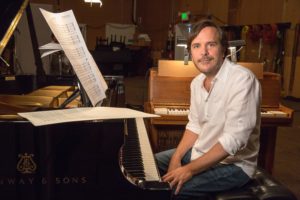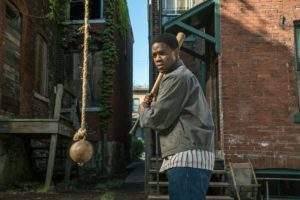
“We all know people who are lovable AND extremely hurtful,” began Marcelo Zarvos, the young looking composer of the movie, Fences. When Zarvos was first given the Fences script, he had already loved August Wilson’s play: a family saga with a blue-collar, frustrated, African American father at its center. Shot in hardboiled, dreary Pittsburgh, PA., Denzel Washington both directs and stars as Troy, the intimidating, verbose, and often cruel patriarch, who in truth, can barely read.
Although the play and movie are set in America’s 1950s, when Zarvos watched an early cut with the editor he realized that the movie would be better served with a universally appealing score, rather than the bluesy, jazzy music of its time. “It would have to be a fine line to support the performances,” he noted. The original Pulitzer Prize winning drama itself, had no music, and instead of the score becoming its own, possibly intrusive character, Zarvos wondered aloud to his director, “Can we uncover something else about the characters through the new music.” Denzel Washington took Zarvos’ note under consideration, and realized that the brutality the family undergoes shouldn’t be upstaged. Full of scenes already overflowing with emotion and trauma, Zarvos felt the music should show respect in its functionality and help navigate the highly dense dialogue, rather than drive the film.
Having worked on more than sixty film and television projects before, it was an unusual but certainly welcome experience for the composer to have the director’s undivided attention. Zarvos felt blessed. Washington was along for the process as Zarvos’ goal was for the sound and dialogue to become one. Indeed, Washington is said to have a very inclusive way of working with his crew and “he was like a conductor shaping this. It was a fascinating thing to see,” marveled the composer.

Zarvelos had worked with many directors over the years, including Robert De Niro on The Good Shepherd in 2006 and Jodie Foster on The Beaver in 2011, but working with Washington and the crew on translating Fences, from a beloved play to the screen was “a whole different animal,” he explained. He tried to break his work down into three major modes: Transitional moments, a scene or act change, and finally, passage of time cues. It’s important to be able to bridge two different parts of the story through music and in this case, “The music works like a focus into the words in more of a spiritual manner,” Zarvos related.
For instance, the first time we see Gabriel in the film (Troy’s ethereal brother, who is brain damaged from the war), is the first time the film audience actually hears music. “He IS the music. He’s the one talking about God and we make the connection between music and spirituality,” offered Zarvos. When Gabriel tries to emit sound from his trumpet, after a pivotal death scene, nothing comes out at first. Oddly, Zarvos related that their WAS a little sound on the set at this crucial moment, although not a special effect. It seemed to be the sound of a gate. Gabriel’s trumpet sound is symbolic in that it is needed to open up the gates of Heaven. The fact that the cast and crew heard an actual gate while filming, was indeed eery and perhaps apropos. At the moment of the mysterious sound, their leader and director, Denzel Washington, spun around and told the crew, the unaccounted for sound was August Wilson’s spirit. A blessed project indeed.





